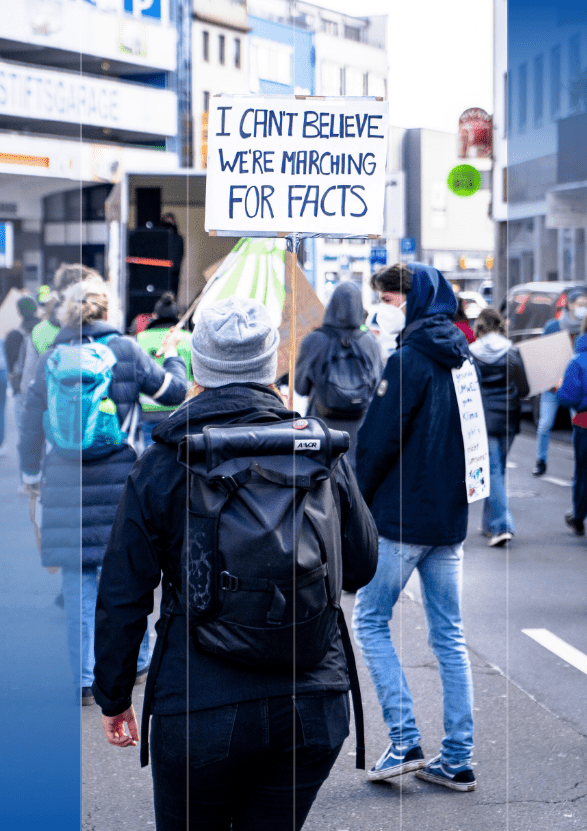

New Study: Attitudes and Perceptions of Disinformation in Europe
Dr. Kai Unzicker
Democracy relies on an open, transparent, and, above all, fact-based public discourse. Not solely since the COVID-19 pandemic and the conflict in Ukraine, but especially (intensively) since then, the democratic public sphere has been threatened by digital disinformation. By this, we mean the intentional spread of false information with the aim of causing harm or creating uncertainty. It is intended to manipulate public opinion and heavily influence political discourse. In our new study, we took a closer look at how citizens of the European Union perceive disinformation and what kind of experiences they have had with it so far.
EU Citizens Demand More Action Against Disinformation from Politics and Platforms
Our survey of over 13,000 individuals clearly demonstrates that an overwhelming majority of EU citizens want more effort in combating disinformation. 40 percent fully agreed, and an additional 45 percent somewhat agreed with the statement that “Politicians should do more to combat the spread of disinformation on the internet.” Moreover, with regards to the statement, “Social media operators, such as Twitter, Facebook, Instagram, or TikTok should make greater efforts to combat the spread of disinformation on their platforms,” 53 percent fully and 36 percent somewhat agreed. In both cases, this adds up to over 80 percent of respondents expecting more action from both politics and platforms.
Majority of Respondents Are Uncertain Whether Online Information Is True or False
A noteworthy majority – making up 54 percent of EU citizens – is frequently or even very frequently uncertain of whether information on the internet is true or false. This uncertainty is particularly pronounced in Italy (63 percent), Spain (57 percent), and France (55 percent). In Germany, slightly fewer people are uncertain about the accuracy of information, with only 47 percent indicating their doubt. The lowest percentage is found in the Netherlands, at 38 percent. These figures suggest that the spread of disinformation has likely already achieved an important goal: increasing uncertainty. Reliable information is the core foundation to forming an informed opinion and thus integral for democratic discourse. People in Europe feel a great overall uncertainty about which digital content is trustworthy, and which has been intentionally manipulated. It is therefore important that anyone wishing to protect and strengthen democracy must prevent leaving citizens alone in dealing with disinformation.
Over a Third of EU Citizens Frequently Encounter Disinformation Online
39 percent of EU citizens reported that they have frequently or even very frequently encountered disinformation on the internet. Only 11 percent of all respondents stated that this has not been the case for them at all. These figures indicate that the spread of disinformation seems to be a common and universal phenomenon, especially as these numbers do not account for cases where respondents may not have realised that the information, they encountered might be false.
Less Than Half of EU Citizens Have Verified Internet Information for Accuracy
There is significant uncertainty regarding the accuracy of online information, and at the same time, many people frequently encounter disinformation. It is important to highlight, however, that only a minority of the EU citizens surveyed, stated that they verified or checked information on the internet for its accuracy. Only 44 percent expressed they have done so at least once. Even fewer respondents have ever reported posts on social media for disinformation (22 percent) or alerted other users to it (also 22 percent). In contrast, according to their own statements, only 11 percent of respondents have inadvertently shared or liked false information. The study found that age and education significantly influence how disinformation is handled. Younger and more educated respondents actively engage with information. As educational levels rise, more individuals are likely to fact-check information. Similarly, younger respondents are more likely to report false information as well as point out such misinformation to others.
Ambivalent Views on the Impact of Social Media on Democracy
Despite the EU citizens’ uncertainty and a clear encounters of disinformation in the digital sphere, the view on social media is not as negative as one might assume. While 28 percent of respondents attribute a positive impact on democracy to social media, 30 percent believe that social media have negative effects. For the relative majority of 42 percent, social media is seen to contain both positive and negative aspects for democracy.
What Needs to Be Done to Combat Disinformation? Recommendations for Action
Derived from the results of our study, we bring forth four key recommendations for combating disinformation:
- • Establish a systematic means of monitoring the phenomenon of disinformation in Germany and Europe. Disinformation is a pervasive issue that has yet to be fully explored. Further, we anticipate the growing prevalence of AI-generated or manipulated texts, images and videos in the near to medium-term future. Reliable and competent bodies and institutions must spearhead comprehensive monitoring to accurately gauge the true extent and impact of disinformation to mitigate this development.
- Foster widespread awareness of disinformation within the general population. The study highlights substantial levels of uncertainty amongst the public regarding disinformation. Drawing attention to the topic and providing the means for citizens to access reliable information are of utmost importance.
- • Cultivate media and news literacy across all generations. Evolving media landscapes offer both opportunities and challenges. The ability to differentiate trustworthy sources from suspicious ones, distinguish between opinions and facts, and identify potentially false or distorted information are indispensable skills that should be embraced by as many individuals as possible.
- Guarantee consistent and transparent content moderation on digital platforms.Operators of these platforms shoulder special responsibility. Detecting, marking and – ideally – correcting or removing false information, along with ensuring easy access to reliable information during critical discussions, constitute central tasks.
The complete study can be downloaded here. The press release for the study is available here (DE).




